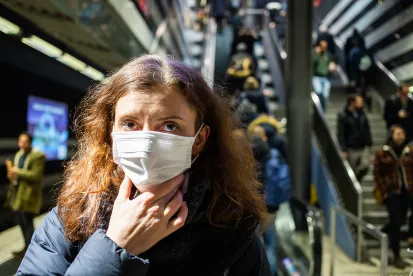In any time of crisis, there is heightened risk for fraud and scams. While United States Attorney General Barr has warned of scams and other illegal acts on the federal level,1 it is with the state Attorneys General (“AGs”) where the rubber hits the road in enforcing social distancing orders, investigating companies for alleged price gouging, continuing ongoing investigations, and overseeing lending relief efforts. As the economy begins to reopen on a state-by-state and sector-by-sector basis, companies must be vigilant in protecting themselves from the next wave of scrutiny by state AGs.
During normal times, state AGs rely upon their state’s Consumer Protection Act and Unfair or Deceptive Acts or Practices (UDAP) statutes to fight against perceived fraud. During the COVID-19 crisis, state AGs have taken the additional step of issuing Civil Investigative Demands, mostly focused on the issue of price gouging, or an instance in which a company allegedly inflates prices above a perceived acceptable level based not solely on supply and demand, but also on leveraging, in this case, the COVID-19 pandemic to the detriment of the consumer. Allegations of price gouging often appear during or immediately following natural disasters, an example of which would be heightened prices for essential products such as generators and flashlights in historically hard-hit areas such as Florida or New Orleans during the Atlantic hurricane season. In the current environment, state AGs across the country are each receiving literally hundreds of consumer complaints alleging that companies are similarly raising prices on necessities.2 Online platforms for third-party sellers are particularly vulnerable to state AGs in this environment, with most people sheltering in place and fulfilling the majority of their purchasing needs through online retail. In fact, 33 state AGs sent a letter to Amazon.com, Inc., Facebook, Inc., Craigslist, Inc. and eBay Inc. to request enhanced procedures to protect against price gouging on their respective platforms.3 Ironically, companies such as Facebook, Google, Navient, and others that have been targeted by state AGs, often on extremely flimsy legal grounds, are now being asked by those same regulators to continue their efforts to step up to assist in this pandemic. And those companies, and so many others, are doing just that.
However, there are indeed some bad actors. In one well-publicized example, two Tennessee men hoarded over 17,000 bottles of hand sanitizer with the intent to sell them for up to $70 per bottle and was immediately met by an expedited investigation by Tennessee AG Herbert Slatery.4 Other examples have abounded: Massachusetts AG Maura Healey unilaterally expanded her state’s price gouging regulations, which had previously been limited to gasoline and petroleum products, to include “all goods or services necessary for the health, safety or welfare of the public”;5 New York AG Letitia James sent cease and desist letters to merchants that were allegedly engaging in price gouging related to the sale of hand sanitizer and disinfectant;6 New Jersey AG Gurbir Grewal has sent over 80 cease and desist letters after receiving more than 600 complaints of COVID-19-related price gouging and other related consumer protection violations;7 Florida AG Ashley Moody activated a “Price gouging Hotline” and opened an investigation into third-party sellers accused of price gouging on essential goods through accounts on Amazon;8 and finally, 20 state AGs have implored 3M Company to create a database and accounting of the distribution and pricing of 3M’s N95 respirator masks, including urging 3M to publish its policies prohibiting price gouging.
Businesses that remain open should be mindful of the additional steps taken to ensure compliance with social distancing regulations. For example, Vermont AG T.J. Donovan issued a directive for law enforcement outlining guidance for the enforcement of the state’s COVID-19 Executive Order that, among other things, extended authority to the state Department of Public Safety to inspect the premises and records of any employer to ensure compliance with the Executive Order.9 Other state AGs are enforcing their states’ Executive Orders with similar diligence: New York AG James ordered over 70 medical transportation companies to stop providing group rides;10 Michigan AG Dana Nessel sent a letter to home improvement store Menards in the wake of reports that the retailer had engaged in business practices that would endanger consumers and employees contrary to the Executive Order issued by Michigan Governor Gretchen Whitmer;11 and Delaware law enforcement officials even issued cease and desist orders to a barber shop and a tobacco shop.12
As the economy begins to incrementally ‘reopen’ in the weeks and months to come, companies should document every step taken to protect their customers and employees as well as the rationale underlying those measures. The far-reaching effects of the COVID-19 pandemic are unlikely to subside until a vaccine becomes publicly available. Thus, state AGs are likely to continue to probe companies aggressively about safety measures taken to protect their customers and employees; adherence to government policies and interpretative guidance; their definition of essential employees; and whether the company contributed to the spread of the virus.
State AGs are the top law enforcement officers in their states and will continue to act to protect their citizens during, and long after, the COVID-19 crisis is over. Industry should be on the lookout for measures taken by state AGs to identify and prosecute fraud and perceived price gouging during the COVID-19 pandemic, and should comply with laws and Executive Orders as diligently as possible. What constitutes the requisite compliance with social distancing – both now and as the economy begins to reopen – and what constitutes an essential service are often somewhat subjective and may require the consult of counsel. Cadwalader’s state AG practice is regularly in close communication with state AG offices and is well-positioned to provide guidance to clients that may be in receipt of an inquiry from a state AG, and we stand ready to continue to assist clients as they navigate the implications of the COVID-19 pandemic.
2 https://www.cadwalader.com/state-attorney-general-insider/index.php?nid=6&eid=34
3 https://www.attorneygeneral.gov/wp-content/uploads/2020/03/03_25_2020_Multistate-letter.pdf
4 On April 21, 2020, Tennessee AG Slatery announced that a settlement had been reached with the two men to resolve allegations of price gouging; all supplies were surrendered to a nonprofit organization in Tennessee and a portion of the supplies were distributed to officials in Kentucky, and the two men were prohibited from selling emergency or medical supplies grossly in excess of the price generally charged during any declared state of abnormal economic disruption related to the COVID-19 pandemic.
6 https://ag.ny.gov/press-release/2020/ag-james-price gouging-will-not-be-tolerated
7 https://www.njconsumeraffairs.gov/News/Pages/03172020.aspx
8 http://www.myfloridalegal.com/newsrel.nsf/newsreleases/A32615BF3942B33E8525854300514289?Open&
9 https://www.attorneygeneral.gov/wp-content/uploads/2020/03/03_25_2020_Multistate-letter.pdf
11 https://www.michigan.gov/coronavirus/0,9753,7-406-98158-523976--,00.html
12 https://www.delawarepublic.org/post/delaware-flagging-non-essential-businesses-open-during-shutdown





 />i
/>i

